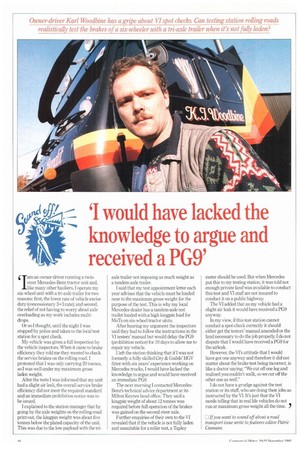would have lacked the knowledge to argue and received a PG9'
Page 48

If you've noticed an error in this article please click here to report it so we can fix it.
iI am an owner-driver running a twinsteer Mercedes-Benz tractor unit and,
like many other hauliers, I operate my six-wheel unit with a tri-axle trailer for two reasons: first, the lower rate of vehicle excise duty (concessionary 3+3 rate); and second, the relief of not having to worry about axle overloading as my work includes multidrops.
Or so I thought, until the night I was stopped by police and taken to the local test station for a spot check.
My vehicle was given a full inspection by the vehicle inspectors. When it came to brake efficiency they told me they wanted to check the service brakes on the rolling road. I protested that I was only can-ying 20 tonnes, so I was well under my maximum gross laden weight
After the tests I was informed that my unit had a slight air leak, the overall service brake efficiency did not meet the required standard and an immediate prohibition notice was to be issued.
I explained to the station manager that by going by the axle weights on the rolling-road print-out, the kingpin weight was about five tonnes below the plated capacity of the unit. This was due to the low payload with the tri axle trailer not imposing as much weight as a tandem-axle trailer.
I said that my test appointment letter each year advises that the vehicle must be loaded near to the maximum gross weight for the purpose of the test. This is why my local Mercedes dealer has a tandem-axle test trailer loaded with a high kingpin load for MoTs on six-wheel tractor units.
After hearing my argument the inspectors said they had to follow the instructions in the VI testers' manual but would delay the PG9 (prohibition notice) for 10 days to allow me to repair my vehicle.
I left the station thinking that if! was not formerly a fully skilled City & Guilds' HGV fitter with six years' experience working on Mercedes trucks, I would have lacked the knowledge to argue and would have received an immediate PG9.
The next morning I contacted MercedesBenz's technical advice department at its Milton Keynes head office. They said a kingpin weight of about 12 tonnes was required before full operation of the brakes was gained on the second steer axle.
Further enquiries of their own to the VI revealed that if the vehicle is not fully laden and unsuitable for a roller test, a Tapley meter should be used But when Mercedes put this to my testing station, it was told not enough private land was available to conduct this test and VI staff are not insured to conduct it on a public highway.
The VI added that as my vehicle had a slight air leak it would have received a PG9 anyway.
In my view, if this test station cannot conduct a spot-check correctly it should either get the testers' manual amended or the land necessary to do the job properly.! do not dispute that! would have received a PG9 for the airleak.
However, the VI's attitude that I would have got one anyway and therefore it did not matter about the brake test being incorrect is like a doctor saying "We cut off one leg and realised you couldn't walk, so we cut off the other one as welt."
I do not have a grudge against the test station or its staff, who are doing their jobs as instructed by the VI. It's just that the VI needs telling that in real life vehicles do not run at maximum gross weight all the time. y
0 If you want to sound off about a road transport issue write to features editor Patric Cunnane.
















































































